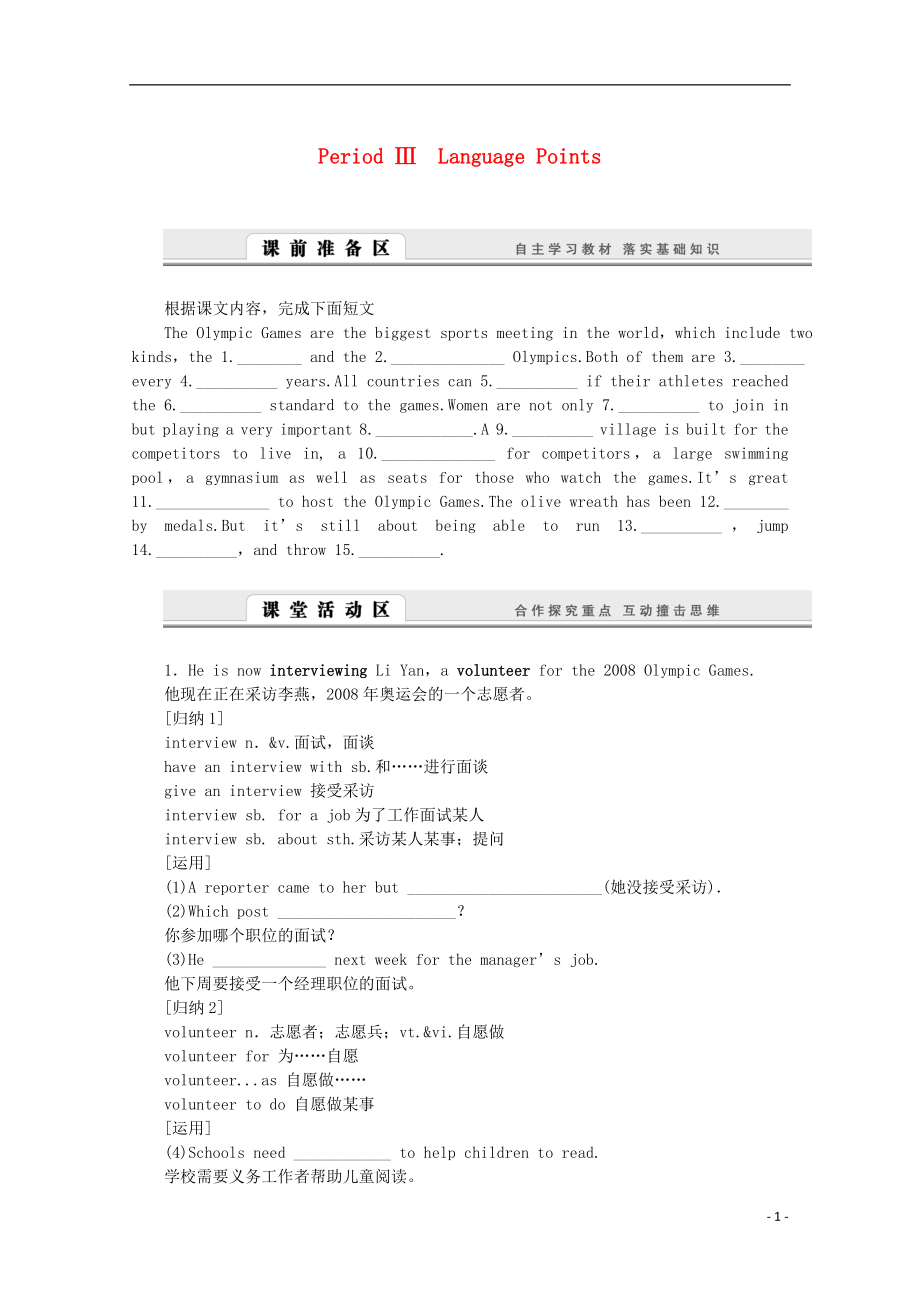《2016-2017學(xué)年高中英語(yǔ) Unit 2 The Olympic Games Period Ⅲ Language Points學(xué)案 新人教版必修2》由會(huì)員分享���,可在線閱讀�,更多相關(guān)《2016-2017學(xué)年高中英語(yǔ) Unit 2 The Olympic Games Period Ⅲ Language Points學(xué)案 新人教版必修2(4頁(yè)珍藏版)》請(qǐng)?jiān)谘b配圖網(wǎng)上搜索����。
1、
Period Ⅲ Language Points
根據(jù)課文內(nèi)容����,完成下面短文
The Olympic Games are the biggest sports meeting in the world,which include two kinds����,the 1.________ and the 2.______________ Olympics.Both of them are 3.________ every 4.__________ years.All countries can 5.__________ if their athletes reached the 6.____
2�、______ standard to the games.Women are not only 7.__________ to join in but playing a very important 8.____________.A 9.__________ village is built for the competitors to live in, a 10.______________ for competitors��,a large swimming pool�,a gymnasium as well as seats for those who watch the games.It’
3、s great 11.______________ to host the Olympic Games.The olive wreath has been 12.________ by medals.But it’s still about being able to run 13.__________����,jump 14.__________,and throw 15.__________.
1.He is now interviewing Li Yan����,a volunteer for the 2008 Olympic Games.
他現(xiàn)在正在采訪李燕,2008年奧運(yùn)會(huì)的一個(gè)志愿者�。
4、[歸納1]
interview n.&v.面試����,面談
have an interview with sb.和……進(jìn)行面談
give an interview 接受采訪
interview sb. for a job為了工作面試某人
interview sb. about sth.采訪某人某事;提問(wèn)
[運(yùn)用]
(1)A reporter came to her but ________________________(她沒(méi)接受采訪).
(2)Which post ______________________���?
你參加哪個(gè)職位的面試�?
(3)He ______________
5����、next week for the manager’s job.
他下周要接受一個(gè)經(jīng)理職位的面試����。
[歸納2]
volunteer n.志愿者�����;志愿兵�;vt.&vi.自愿做
volunteer for 為……自愿
volunteer...as 自愿做……
volunteer to do 自愿做某事
[運(yùn)用]
(4)Schools need ____________ to help children to read.
學(xué)校需要義務(wù)工作者幫助兒童閱讀。
(5)He ____________________ a driver.
他自愿服務(wù)充當(dāng)司機(jī)���。
(6)Several st
6、aff members ____________________ early retirement.
幾個(gè)職員自愿提前退休��。
2.It’s in the Summer Olympics that you have the running races����,together with swimming,sailing and all the team sports.
正是在夏季奧運(yùn)會(huì)上才有賽跑�����、游泳����、帆船和所有的團(tuán)隊(duì)體育項(xiàng)目����。
[歸納]
此句為一個(gè)It was ...that...強(qiáng)調(diào)句型����。強(qiáng)調(diào)句型的結(jié)構(gòu)為“It is/was+被強(qiáng)調(diào)部分+that/who從句”。即使被強(qiáng)調(diào)的主語(yǔ)是復(fù)數(shù)��,主句
7�、中仍用“it is/was...that/who...”形式。強(qiáng)調(diào)句可以強(qiáng)調(diào)句子的主語(yǔ)��、賓語(yǔ)或狀語(yǔ)����,被強(qiáng)調(diào)的可以是名詞、代詞�,也可以是短語(yǔ)或句子。
[運(yùn)用]
(1)__________________________ helped us out of trouble.
是杰克和湯姆幫助我們擺脫了麻煩��。
(2)It ________ we had stayed together for a couple of weeks ________ I found we had a lot in common.
A.was until���;when
B.was until��;that
C.wasn
8���、’t until�;when
D.wasn’t until�;that
(3)—Where did you get to know her?
—It was on the farm ________ we worked.
A.that B.there
C.which D.where
3.No other countries could join in, nor could slaves or women.
別的國(guó)家不能參加,奴隸和婦女也不能參加����。
[歸納]
nor could slaves or women 是一個(gè)倒裝句型?���!皀either/nor+助動(dòng)詞/
9、情態(tài)動(dòng)詞/have/be動(dòng)詞+主語(yǔ)”表示后面這個(gè)主語(yǔ)與前一主語(yǔ)情況一樣�����,也如此����,意為“也不���,也沒(méi)有”�����。so 用于倒裝結(jié)構(gòu)時(shí)����,多用于“so+be動(dòng)詞/助動(dòng)詞/情態(tài)動(dòng)詞+主語(yǔ)”結(jié)構(gòu),表示某人或某物的情況與前面所敘述的肯定情況相同��,該結(jié)構(gòu)的謂語(yǔ)應(yīng)與前句謂語(yǔ)的時(shí)態(tài)�、語(yǔ)態(tài)相一致,但前后兩句的主語(yǔ)不同�����。
so在“so+主語(yǔ)+be動(dòng)詞/助動(dòng)詞/情態(tài)動(dòng)詞”的陳述結(jié)構(gòu)中�����,則表示贊同����,意為“確實(shí);的確如此”�,對(duì)前文所敘述的情況起強(qiáng)調(diào)作用,前后兩句主語(yǔ)相同�����。“主語(yǔ)+do/does/did+so”結(jié)構(gòu)指的是按上句的要求做了��。此句型中do so 代替上文中要求做的事����,以免重復(fù)。
So it is with...或I
10����、t is the same with...句型表示“……的情況也是如此”。當(dāng)前面句子中有幾種不同形式的謂語(yǔ)時(shí)����,要表示相同的情況,必須使用本句型�����,不能用so引導(dǎo)的倒裝句��。
[運(yùn)用]
(1)—My room gets very cold at night.
—________.
A.So is mine B.So mine is
C.So does mine D.So mine does
(2)—I’m not going to buy that English-Chinese dictionary.
—________.It’s too expensive.
11���、
A.Neither am I B.I don’t either
C.So am I D.I am not����,too
(3)—I reminded you not to forget the appointment.
—________.
A.So you did B.So I do not
C.So did you D.So do I
4.Women are not only allowed��,but play a very important role in gymnastics, athletics�,team sports and
12、...
婦女不僅被允許參加����,而且在體操、田徑�、團(tuán)體運(yùn)動(dòng)等中起著重要作用……
[歸納]
allow sb. to do sth.=let sb. do sth.允許某人做某事
allow doing sth.允許干某事
allow sb.sth.使某人得到……
allow for sb./sth. 估計(jì)到,連……算在內(nèi)���;考慮到��;體諒
allow of sth.容許��,容得����;使有可能(后面常接否定形式)
allow +thatclause接受��;承認(rèn)����;同意
[運(yùn)用]
(1)My parents wouldn’t ________________ to the party.
我父
13��、母不準(zhǔn)許我去參加晚會(huì)����。
(2)We do not ____________ in the classrooms.
我們不允許在教室吃東西��。
(3)The boss ________________________ for meals.
老板只給他們20分鐘的吃飯時(shí)間��。
(4)It will take you half an hour to get to the station����,____________________.
把路上的耽擱算進(jìn)去,你要用半小時(shí)才能到車(chē)站���。
Period Ⅲ Language Points
課前準(zhǔn)備區(qū)
1.Summer 2.Winter 3.held
14���、4.four 5.take part 6.agreed 7.allowed 8.role 9.special 10.stadium
11.honour 12.replaced 13.faster 14.higher
15.further
課堂活動(dòng)區(qū)
1.(1)she didn’t give an interview
(2)are you being interviewed for
(3)has an interview
(4)volunteers
(5)volunteered his services as
(6)volunteered for
2.(1)It was Jack and Tom who (2)D (3)D
3.(1)C (2)A (3)A
4.(1)allow me to go
(2)allow eating
(3)allowed them only 20 minutes
(4)allowing for traffic delays
- 4 -
 2016-2017學(xué)年高中英語(yǔ) Unit 2 The Olympic Games Period Ⅲ Language Points學(xué)案 新人教版必修2
2016-2017學(xué)年高中英語(yǔ) Unit 2 The Olympic Games Period Ⅲ Language Points學(xué)案 新人教版必修2

